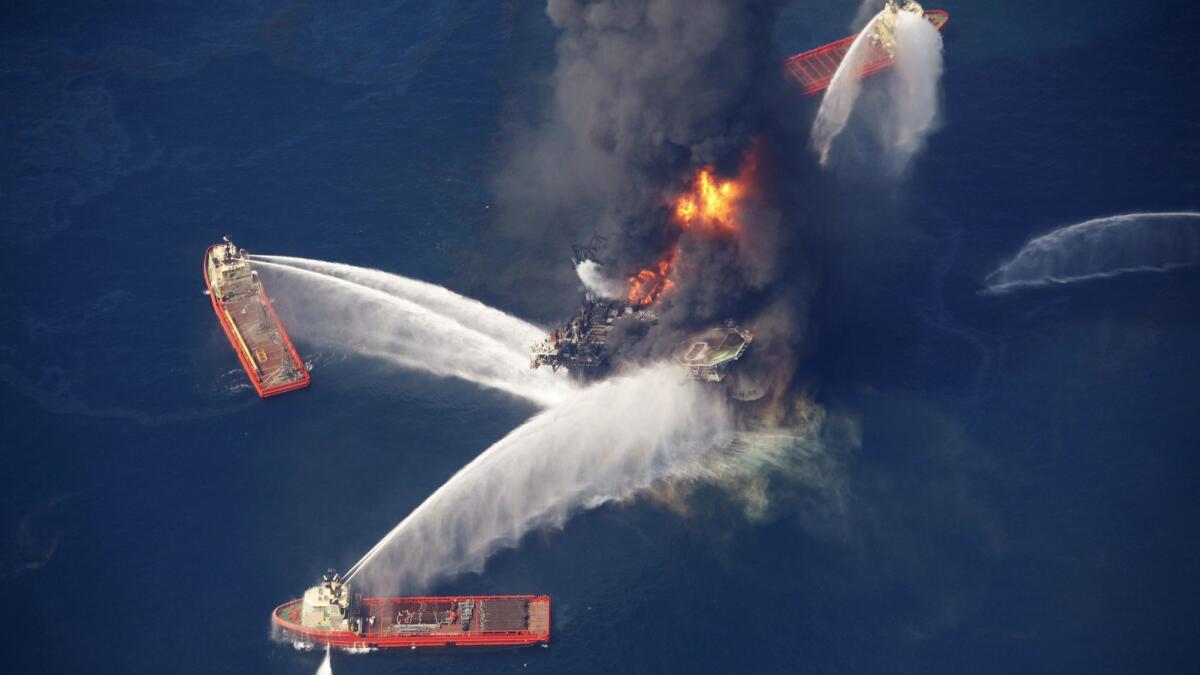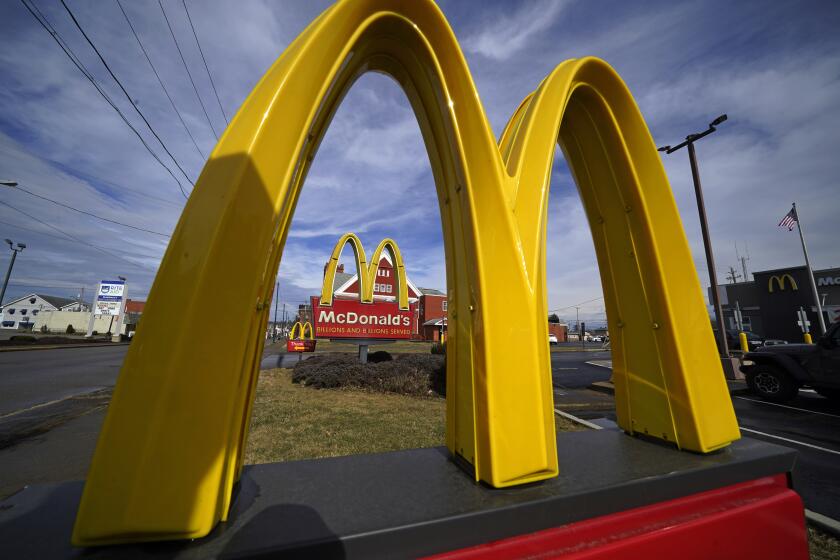Column: As lawsuits over climate change heat up, oil industry steps up attacks on its critics

The oil industry has been depicting itself lately as the target of a conspiracy by scientists, local government officials and climate change activists to make it look bad.
It would be odd to think that a conspiracy is necessary to punch holes in the fossil fuel companies’ public reputation, but here’s the argument presented by the Independent Petroleum Assn. of America, one of the industry’s leading lobby organizations.
“In a highly-coordinated move,” the IPAA declares on its website, “nearly 30 scientists, government officials and third-party organizations recently joined the fledgling climate litigation campaign.” The IPAA labeled this a “free-for-all” and quoted an industry newsletter calling the campaign “a carefully orchestrated effort by local governments in California and elsewhere to use state law to collect damages from companies producing and marketing fossil fuels.”
False and deceptive marketing, ... campaigns to deceive the public — those are traditional state police power matters.
— Victor Sher, plaintiff’s attorney in climate change lawsuits
If you think this sounds like a Goliath pretending to be a David, you are right. The litigation campaign IPAA refers to is a cluster of lawsuits pioneered in 2017 by the California counties of San Mateo, Imperial Beach, Marin and Santa Cruz, and the cities of Richmond, Oakland and San Francisco, among other jurisdictions, against more than 20 oil and gas companies.
The plaintiffs assert that the companies freely promoted the use of their products even though they were aware of the products’ effect on global warming — information the industry allegedly suppressed for years. The municipalities are asking that the companies be forced to help pay for the damage wreaked by climate change, including drought, wildfires, sea level rise and extremes of heat and precipitation. Since the filing of the California cases, similar lawsuits have been filed by Rhode Island, Washington’s King County (that is, Seattle), Baltimore and New York City.
The oil companies succeeded in transferring the state lawsuits to federal court, where they expect to face less liability under the law. The plaintiffs’ argument that the cases belong back in state court is being heard by the U.S. 9th Circuit Court of Appeals in San Francisco.
What has the industry vibrating at the moment is a sheaf of eight friend-of-the-court, or amicus, briefs all filed on Jan. 29 with the appellate court supporting the transfer back to state court. Among other parties, the briefs were filed by the California Assn. of Counties, the Natural Resources Defense Council, a group of six prominent oil company critics, and the National League of Cities.
To the industry, this looks like a cabal. In a blog post, the IPAA found something sinister in “the fact that all eight of the briefs were filed within hours of one another on a random January afternoon (i.e. there wasn’t a court-designated deadline).” Not only was that “reason enough to suspect some level of coordination took place,” the blog post observes, but “signing onto the amicus briefs were many of the activists and politicians who have played key roles in the broader campaign to take down the oil and natural gas industry for years.”
A couple of points are pertinent here. First of all, there was indeed a court-designated deadline for filing the briefs — Jan. 29, the day they were filed. The court’s procedural calendar specifies that amicus briefs must be filed no later than seven days after the main brief of the party they’re supporting. The California plaintiffs filed their brief on Jan. 22, seven days earlier. So much for the “coordination.”
Second, why should it be so odd that the supporters of the cities and counties are drawn from the community of fossil fuel critics? Who else?
Let’s examine some of the industry’s other points. Among the chief targets of its pushback are Naomi Oreskes and Geoffrey Supran of the Department of the History of Science at Harvard University, who filed one of the amicus briefs in conjunction with four other scholars with interest in climate change science.
Oreskes and Supran were the authors of a 2017 study detailing the industry’s determined, decades-long effort to suppress scientific evidence of global warming caused by the burning of fossil fuels, despite warnings by its own scientific researchers that the phenomenon was genuine, dangerous and accelerating.
We reported here on their study, which focused on Exxon Mobil. They compared hundreds of Exxon Mobil’s internal reports and peer-reviewed research papers with its advertising — especially paid “advertorials” the company placed in the op-ed section of the New York Times from 1972 through 2001. The authors concluded that Exxon Mobil had systematically “misled non-scientific audiences about climate science.”
The IPAA blog post claims that the Oreskes-Supran study has been debunked, but that’s not so. Their statistical method was questioned by another researcher, who was paid by Exxon Mobil. But the core of their findings wasn’t statistical but empirical. They compared internal company documents with the ad campaign, and found them wildly divergent.
Oreskes, in an email, labeled the so-called debunking “the sort of expert-for-hire doubt-mongering” engaged in by the tobacco industry when it was fighting medical science over the dangers of smoking. That’s a topic she’s familiar with, having covered it in the 2010 book “Merchants of Doubt,” co-written with Erik M. Conway.
It’s hardly surprising that the oil industry would be uneasy about the “fledgling climate litigation campaign.” The plaintiffs aim to use state laws to fix blame on the fossil fuel companies in ways that can’t be accomplished under federal environmental laws such as the Clean Air Act.
Indeed, federal law vests the states with primary responsibility for addressing air pollution, according to Victor Sher, the San Francisco attorney representing the counties and cities. “Cases involving false and deceptive marketing, overpromotion of products, campaigns to deceive the public — those are traditional state police power matters that the Clean Air Act doesn’t address at all.”
Federal Judge Vince Chhabria of San Francisco largely agreed last March, when he ordered the lawsuits returned to state court. The oil companies appealed his order, which is why it’s now before the 9th Circuit bench.
The municipalities also are hoping to take advantage of California’s “public nuisance” doctrine, which holds that business can be held responsible for damage done by its products even if their usage was standard practice at the time.
The public nuisance argument was central to a lawsuit brought by California municipalities against lead paint manufacturers that concluded in 2017 with an order that the companies pay to clean up residual lead in dwellings that could pose a health hazard to children in those homes.
There’s no question that the cities and counties face a long and arduous road to saddling the oil industry with the responsibility for climate change and the expense of addressing its impacts. The lead paint lawsuit lasted 17 years before the verdict was made final.
But there’s also no question that the industry did its best to hide what it knew about the prospects of global warming and its products’ role in it. The latest misleading attack on its critics shows, if nothing else, that it still hasn’t learned to tell the truth, the whole truth and nothing but the truth.
Keep up to date with Michael Hiltzik. Follow @hiltzikm on Twitter, see his Facebook page, or email michael.hiltzik@latimes.com.
Return to Michael Hiltzik’s blog.
More to Read
Inside the business of entertainment
The Wide Shot brings you news, analysis and insights on everything from streaming wars to production — and what it all means for the future.
You may occasionally receive promotional content from the Los Angeles Times.











